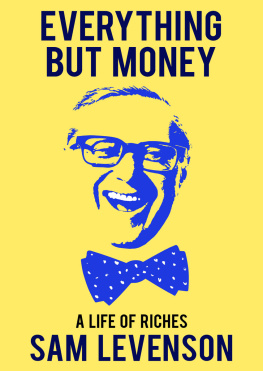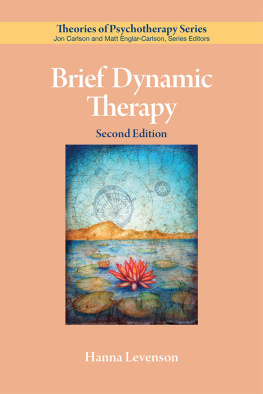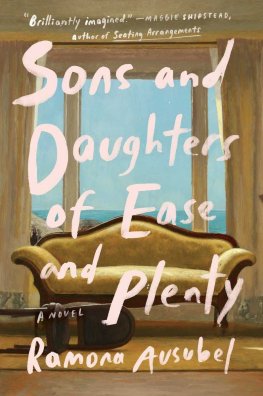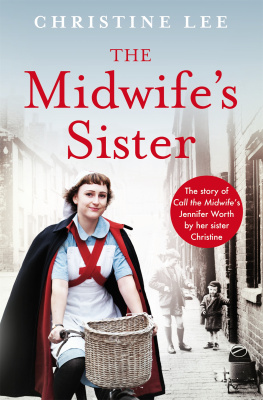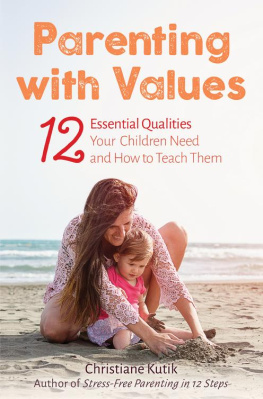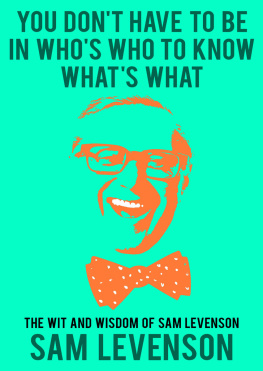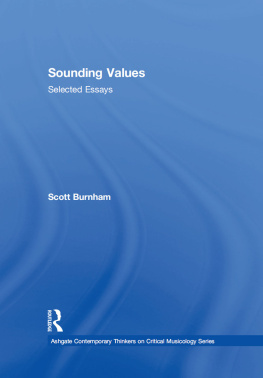Everything But Money
A Life of Riches
Sam Levenson
To brother Bill
ACKNOWLEDGMENTS
This book has been a family project. I am profoundly indebted to my wife for discussing ideas with me; to my daughter Emily for reading the manuscript aloud to me and to anyone else who would listen; to my son Conrad for his points of view; to brother Albert and his good wife Helen for typing; to Uncle Harry and Aunt Beth also for typing; to Emilys friend Philip for more typing; to Emilys friend Susie for her frank teenage reactions.
I owe special thanks to Peter Matson for bringing the book to the attention of Simon and Schuster; to Charlotte Seitlin of Simon and Schuster for patient direction and editing; to Charlotte Greene for much good advice; to an old friend, Dave Vern, who as far back as twenty years ago sat around and exchanged reminiscences with me about our folk heritage; to a very special friend, Sarah Stieglitz, for reading and advising.
To my brothers and sister, and to all the sisters-in-law, for the memories which found their way into the book.
Thanks to the editors of all of the following for the right to use, in revised form, pieces or parts of pieces which I wrote for the New York Herald Tribune, TV Guide, Variety, Congress Weekly, Commentary, the New York Mirror Magazine, Parents Magazine, This Week, Coronet Magazine, Colliers, the Metropolitan Star, Chicago American and United Press International; also to Herb Kamm, managing editor of the New York World-Telegram & Sun, and to Nat Fields.
I
Sweet Horseradish
II
Look, Ma, Im middle class!
III
Off My Chest
IV
My dear children
My parents came to America by invitation. Those who had landed here before them sent back picture postcards of a lady called Miss Liberty. Printed on them were these words:
Give me your tired, your poor,
Your huddled masses yearning to breathe free,
The wretched refuse of your teeming shore.
Send these, the homeless, tempest-tost to me,
I lift my lamp beside the golden door!
It was signed Emma Lazarus, a name that sounded familiar to my parentsperhaps some second cousin on my mothers side. So Mama and Papa packed all their belongings and left for America. After all, who was more tired, poor, huddled, yearning to be free, wretched, homeless and tempest-tost than they?
I was raised as a virtually free American in East Harlem, a section of New York that was called a slum by sightseeing guides and a depressed area by sociologists. Both were right. Our neighborhood fulfilled all the sordid requirements with honors. We were unquestionably above average in squalid tenements, putrid poolrooms, stenchy saloons, cold flats, hot roofs, dirty streets and flying garbage. Yet, paradoxically, I never felt depressed or deprived. My environment was miserable; I was not.
I was a most fortunate child. Ours was a home rich enough in family harmony and love to immunize eight kids against the potentially toxic effects of the environment beyond our door. Since the social scientists do not, as far as I know, have a clinical name for the fortunate possessors of this kind of emotional security, I might suggest they label them the privileged poor. Poverty never succeeded in degrading our family. We were independently poor.
Our home was a battleground in the relentless struggle not only for survival (which even beasts can manage) but for survival with dignity. This was the American Revolution fourth floor back.
Mama and Papa were the leaders of this band of freedom fighters consisting of seven sons and one daughter, whose homemade weapons were hard work, family pride and, above all, faith in education as the major weapon of our liberation movement. Our watchword was a variant of the adage Better to light a candle than curse the darkness. We did curse the darkness quite a bit, but we also lit candles, fires, lampsand we studied by all of them.
Those were not the good old days, but there were more victories than defeats, and each small victory was cause for a large celebration around the dinner table at the end of the day. Each member of the clan would recount his conquests at the shop or in school, with as much gesticulation as exaggeration, to the great delight of the others, who responded with much back-slapping, hysterical laughter and chants of victory. We became superb actors in an unfinished tragi-comedy called The Battle Against Poverty. We tried by every device we could contrive to outwit the enemyto outshout it, upstage it and confuse it by ad-libbing little pieces of business not in the script. We never played it the same way twice. Although we were not sure just how the play would end, we did have visions, not so much of a happy ending as of some happy new beginning in some special place of honor reserved for conquerors of poverty and its alliesdisease and ignorance.
According to studies made by social-service agencies, a good home is defined as one in which there are love, acceptance, belonging, high moral standards, good parental example, decent food, clothing, shelter, spiritual guidance, discipline, joint enterprises, a place to bring friends, and respect for authority. Today any child, rich or poor, who lives in such a home is considered a lucky kid. By these standards, then, I was a lucky kid, not in spite of my home but because of it.
It is also possibleand this is not unusual among poor childrenthat I went on my merry way being merry simply because I did not know any better. I had no idea, for instance, that I was entitled to a bed of my own. It was obvious even to an ordinary kid like me that the more kids you slept with the more fun you had in bed. I figured that was what they meant by bedlam. I didnt know that beds were supposed to be soft. To me bed and board meant one and the same thing.
I didnt feel that privacy was especially desirable. What was attractive about being alone? I thought that going to the bathroom with a friend was real friendly. It transformed a biological necessity into a social amenity.
I didnt know that a long narrow street was not an ideal baseball diamond. I was so busy playing I didnt have time to check the measurements. The butcher store was first base, the sewer second, the laundry third, and the open manhole home plate. You slid in and down, and if you didnt waste your time foolishly while you were there you could find old baseballs.
I didnt know there were good cuts of meat and bad. Our menu at mealtime offered two choicestake it or leave itan approach that seemed to stimulate our appetites. Most meat came to our table in the form of meatballs. (I had an idea that cows laid meatballs the way chickens lay eggs.) I didnt know that meatballs were supposed to contain meat. To this day I dont like the taste of meatballs made of meat. They just dont taste like Mamas.
I didnt know we were supposed to eat fresh bread. Mama said it would give us a bellyache; stale bread was much better for us. She believed so strongly in the stale-bread theory that she even learned to bake day-old bread.
Our block had about twenty tenements; each building about thirty families (not counting sleep-in strangers); each family about 5.6 children (not counting stowaways) by government censusif the census taker could halt the increase long enough to write down the number. There are towns in the United States with smaller populations which have a post office of their own. Yet I never felt crowded in or crowded out. My neighbors never appeared as a crowd to me. To the rich all poor people look alike. To me they were individualsnot all good and kind and noble, but individuals. We knew all about them and they all about us.

